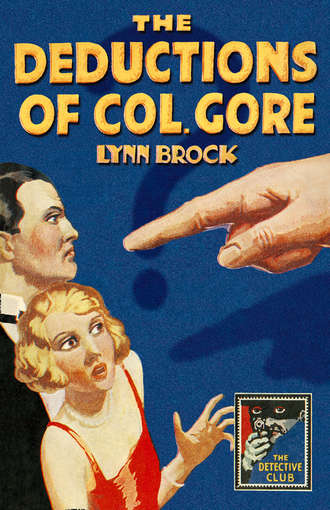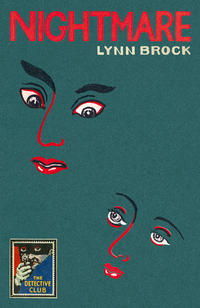
Полная версия
The Deductions of Colonel Gore
‘Only the sheath. Of course the knife may have been lying about there, too, somewhere. I didn’t see it. But then I didn’t look for it. Of course I ought to have. I’ll go across there now and have a look round. Hasn’t anyone noticed that the beastly thing is missing from the hall yet, by the way?’
‘Yes. Clegg noticed it this morning. I heard him telling Sidney about it as he was going out after breakfast.’
‘Didn’t your husband wonder what had become of it?’
‘No. He merely told Clegg to ask the other servants if they knew what had become of it. I don’t suppose he’ll ever think of it again. He never worries about things of that sort. If he does, well … no one knows anything about it. It will be only another lie for me. That’s nothing. I’m an expert liar now.’
‘There’s only one kind of liar, Pickles—and that’s a damn bad one. I present you with that precious chunk of wisdom free gratis and for nothing.’
She laughed bitterly.
‘My dear man, do you think I believe for a moment that Sidney doesn’t know I’ve told him heaps and heaps of lies? Do you think anyone could deceive Sidney? You just try. He isn’t a dear simple old Muggins like you, whom any woman or anyone could bamboozle. If you knew what agony it is for me now—downright agony—to look him in the face—’
‘But … you don’t think he knows anything about this entanglement of yours with Barrington, do you? Not that that wouldn’t be the very best thing that could possibly happen—’
‘I don’t know,’ she said miserably. ‘Sometimes—sometimes I catch Sidney looking at me sometimes so oddly …
‘Then I persuade myself that it’s impossible … that if he knew anything, he’d say so at once and have it out with me. I don’t know what to think. I just keep on trying not to think—trying to wriggle along somehow … just like a worm wriggling in clay … blind … not knowing whether it’s being watched or not … crawling round and round in the old bit of mud. I know I’m bound to get caught in the end. I jolly nearly got caught last night, as a matter of fact. I had hardly got upstairs to my room, after Mr Barrington had gone away, before I heard Sidney go downstairs and go out. I suppose—I hope—someone had rung him up on the telephone … He has a night-telephone in his bedroom, you know … though I didn’t hear the bell ring. He made no reference to his going out at breakfast this morning … naturally I didn’t either. But I was simply scared stiff when I heard him leaving his room. I thought he must have heard us talking in the hall and got up and dressed—perhaps to follow Mr Barrington—’
‘What time was that? When did Barrington go away?’
‘I’m not sure. About half-past one or so, I should say.’
‘How soon after that did your husband go out?’
‘About ten minutes afterwards, I suppose. Perhaps not quite so long.’
‘Oh, well then, I can tell you where he went. I met him last night about twenty-five minutes to two over in Selkirk Place. I’d gone out to post some letters. He told me that he’d been called out to some Mrs MacArthur’s little boy …’
‘Oh,’ she said, relieved. ‘Then that’s all right. Another day to live. Hip-hip-hooray.’
‘Oh, damn it, Pickles,’ he muttered unhappily. ‘Pull yourself together.’
He seated himself again and chewed the stem of his pipe in silence for a little while. Outside darkness had long fallen. Better go back to the hotel and get his pocket-torch, he reflected, before he began hunting about for the knife. If Barrington had thrown it away—it was quite possible that second thoughts had induced him to do so—the knife and sheath might very well have been separated, either in the air, or by collision with the ground or a tree or the railings. Possibly the knife had fallen in the Green inside the railings. It would be a simple matter to climb the railings in the darkness; fortunately they were of no great height.
But—what a mess …
And what an escape …
Suppose she had succeeded in giving the brute a jab, or even a scratch, with the thing— Suppose he had died down there in the hall, as that Masai boy had died—thrashing about on the ground in agony, shrieking— She had never even thought of that, apparently—had fancied, probably, that death would come to him noiselessly and without warning. Good Lord—what an escape for her …
He turned to look at her, discreetly, as she sat leaning forward, staring at the fire, her chin again gathered in her hands. Deliberately he tried to take an impartial, dispassionate view of her, to eliminate the special, mysterious, incalculable quality of her that had, as long as he could remember her, made her for him … different. But even as he strove to strip his witch of her magic, he realised how potent it was—how little a thing that could be amputated by cold-blooded common sense or colder-blooded morality. What she had just told him ought, both common sense and morality assured him, to have almost completely obliterated her glamour for him. As a matter of fact, it had not affected it in the very least. He had simply perceived for himself once more the familiar fact that, in a human system of values—and Wick Gore was a very human person indeed—not the thing done, but the person who did it, mattered.
Her inappropriateness to the part which she had played in this disconcerting narrative of hers was almost ludicrous. It would have been difficult, he told himself, to have imagined a more perfect type, a more satisfying presentment—so far as externals went—of the absolutely ‘nice’ young married Englishwoman. From the tip of her sprucely-waving golden head to the toes of her smartly-sensible shoes, her orderly freshness and daintiness were without blemish—an estate of jealously-guarded, minutely-vigilant propriety—sweet, sound English womanliness, scrupulously-groomed, meticulously decked for the afternoon. And yet, behind that secure, orthodox façade of ‘niceness’, these tempestuous passions had swirled and eddied—eddied and swirled now. He was too shrewd to be far misled by the casual, stereotyped phrases of the modern young woman’s dialect. Beneath them he had had skill enough to detect the stir of the oldest, starkest of human stresses and strains. Love and Hate and Fear had had their way with her. That little mouth, whose lips were set now so coldly, had all but given the kiss of final surrender to one lover, all but betrayed another. That little hand, whose slim fingers upheld her chin childwise, had all but dealt murder. Amazing! And yet he was not amazed—save, indeed, by the knowledge that nothing she could do would ever amaze him in the least.
She turned to him at length, impatiently.
‘Can’t you suggest anything, Wick? I don’t care what it costs—so far as money is concerned—so long as I get those letters of mine back. Couldn’t you—wouldn’t you see him, and try to force him to give them up? I mean—you’re a man. You might be able to frighten him …’
‘I’m perfectly willing to try, of course,’ he said gravely. ‘Though frankly it seems to me that even if you do get your letters back, he’ll still have you in a very nasty place. That hotel-register down at Bournemouth, for instance? … How do you propose to get rid of that? Suppose, even, that he does actually part with your letters—what’s to prevent his coming along to you the very next day and saying, “Look here. I want another five hundred. If I don’t get it, I’m afraid your husband’s going to find out that you stayed at the Palatine Hotel at Bournemouth on such-and-such a date as my wife.” Well … what are you going to do then?
‘However … I’ll see the gentleman, if you wish, and have a preliminary talk about the matter with him at any rate. It may do some good … or it may do quite a lot of harm. What’s his number in Hatfield Place? Twenty-seven, isn’t it?’
‘Yes. When will you see him?’
‘I can go and see him now. Ring up first and find out if he’s at home—and go round straightaway if he is.’
‘I wish you would, Wick,’ she said gratefully. ‘You are a dear old thing. It would be such a relief if I could know that there was even a chance of escaping from this nightmare before I go to Surrey.’
‘You’re going away to Surrey?’
‘Yes. Tomorrow. I’m going up to the Hescotts for Georgie’s wedding. Of course I could cancel it. But Georgie would be most frightfully hurt. She was one of my bridesmaids, you see— And, of course, we’ve always been tremendous pals. I was so sure that all my troubles were to end last night. Do you really think you could see Mr Barrington this afternoon?’
‘I’ll go and ring him up now, if I may. Where’s your telephone?’
‘I’ll show you.’
She rose to her feet, visibly consoled by relief from the despair of inaction.
‘If you don’t see him this afternoon—’
‘I’ll see him some time today. You may rely upon that.’
The murmur of voices on the stairs halted him as he opened the door.
‘The Barracombes,’ said Mrs Melhuish impatiently.
‘Barracombes?’
‘General Barracombe’s girls. They live next door.’
Two fashionably-attired young women appeared in breathless excitement.
‘Barbara, dear,’ exclaimed one, ‘such a dreadful thing has happened poor Mr Barrington! Janet and I have just found him sitting in his car, just outside our door … dead.’
‘At least we’re nearly sure he’s dead,’ broke in her sister. ‘Your husband has gone out to him. We came at once to get him to go out. Isn’t it dreadful? Of course, he may be only unconscious—he may have had a fainting fit or something like that. My dear, I’m positively shaking all over. It gave me such a shock. You see, we spoke to him—at least Hilda spoke to him, and he didn’t answer. And then I thought he looked queer, somehow … and I got up on the footboard and touched his arm. I saw then by his face—’
Her sister checked her. Mrs Melhuish had gone very white suddenly and caught at a chair to steady herself.
‘There—now we’ve frightened you, rushing in this way. Perhaps it is only a fainting fit or something like that. Though I don’t think so. Do you, Janet?’
‘No. I touched his hand. Oh … I shall never forget how deadly cold it felt. I’m sure he’s dead.’
She shuddered luxuriously, rearranging her furs.
Mrs Melhuish had recovered her composure now.
‘How dreadful,’ she murmured. ‘This is a very old friend of mine … Colonel Gore.’
The two young women—they were obviously the kind of sisters who existed in duet—produced beaming smiles of perhaps a second’s duration, and then eclipsed them again to a becoming solemnity. Janet Barracombe stole to the door to peep down into the hall from behind the portière
Конец ознакомительного фрагмента.
Текст предоставлен ООО «ЛитРес».
Прочитайте эту книгу целиком, купив полную легальную версию на ЛитРес.
Безопасно оплатить книгу можно банковской картой Visa, MasterCard, Maestro, со счета мобильного телефона, с платежного терминала, в салоне МТС или Связной, через PayPal, WebMoney, Яндекс.Деньги, QIWI Кошелек, бонусными картами или другим удобным Вам способом.



